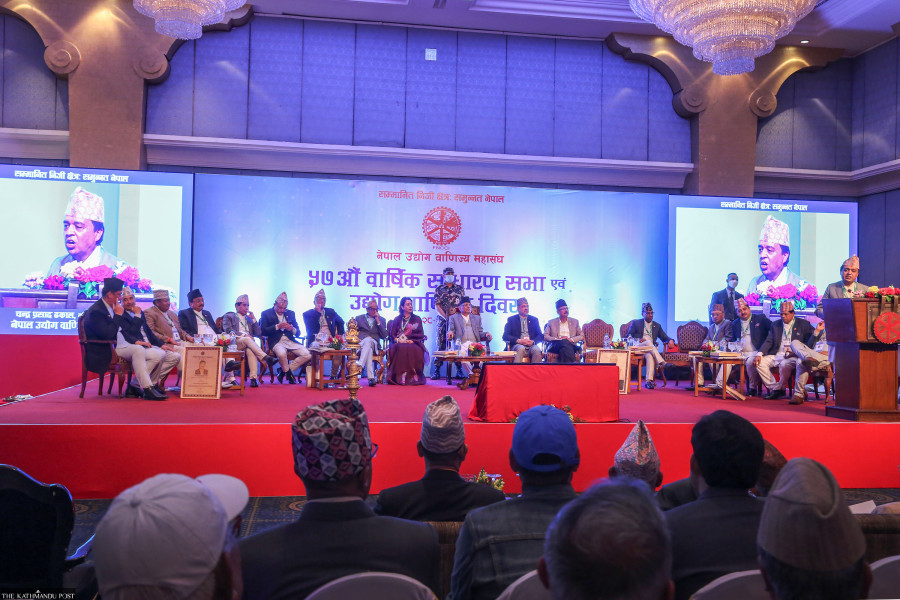Money
Experts paint gloomy picture of economy as FNCCI readies for election
The private sector apex body said that political instability had put the country's economy in total disarray and eroded market confidence.
Post Report
Historic low revenue collection. Historic low foreign direct investment. Historic low market confidence. Historic high labour out-migration. Historic high student numbers applying for higher studies abroad.
Experts paint a gloomy economic picture of Nepal. As usual, they blame political instability for the morass.
“There is uncertainty everywhere due to political instability. We welcomed three prime ministers during my tenure of two years and four months,” said Shekhar Golchha, outgoing president of the Federation of Nepalese Chambers of Commerce and Industry (FNCCI), speaking at its 57th annual general meeting.
Incumbent senior vice-president Chandra Prasad Dhakal will take his place on April 16 as per the FNCCI’s charter.
The private sector apex body said on Tuesday that political instability had put the country's economy in total disarray and eroded market confidence as it prepares to elect a new senior vice-president on April 12 for a three-year term.
"It is difficult to work amid a crisis and uncertainty. During my tenure as president, we faced challenges brought by the Covid-19 pandemic; but we were able to cooperate with the government and the central bank to bring the economy back on the recovery path,” Golchha said.
"It was an interesting recovery as the economic growth rate which was negative by 2 percent grew by 5.8 percent in the last fiscal year," he said.
“Economic activities have declined by half compared to one and a half years ago, and the cost of production has increased. Inflation, which has been hovering around 8 percent for the past nine months, is reducing the purchasing capacity of the people,” he said.
“The government and the central bank should use all available resources for liquidity management and interest rate stability. If the private sector is not able to work, the government will also fail. Government spending has overshot income by Rs150 billion. The government is stressed because it does not have enough resources to pay the salaries of its employees,” Golchha said.
The private sector's contribution to the country’s gross domestic product is 81 percent, and it accounts for 85 percent of the jobs.
The contribution of the manufacturing sector in Nepal’s economy has declined to 6 percent from 15 percent in the past 20 years.
“The cost of production in Nepal is very high, and few investors are attracted to the production sector. For instance, the cost of producing readymade garments in Nepal is higher by 30 percent compared to Bangladesh,” Golchha added.
"The Nepal Trade Integration Strategy is being reviewed for the fourth time, and I do not think the new strategy has analysed the strategies of the past years which failed to boost exports,” Golchha said.
“All the multinational companies operating in Nepal are in profit, but no new multinational companies come here. This shows that there are problems somewhere. The tax revenue to GDP ratio is 21 percent, which is high among South Asian nations,” Golchha said.
Addressing the FNCCI’s annual general meeting, Prime Minister Pushpa Kamal Dahal admitted that the economy was under stress.
“Our economy is under a lot of stress as a result of the Covid-19 pandemic, political instability and Russia's invasion of Ukraine. My third term as prime minister has become more challenging. But this is also an opportunity,” said Dahal.
"From the first cabinet meeting after I assumed the post, I have focused on coordination between the private sector and the government. We are in the final phase of making the budget and the policy and programmes. I have conducted many discussions with the private sector and taken their suggestions,” Dahal said.
“We have held many meetings with the governor of the central bank, the Finance Ministry and others to resolve the economic problems. We are trying to give a way out to the economy,” he said.
“We have prioritised solving liquidity problems. All government agencies are holding intense discussions to reduce the interest rate on loans and increase revenue collection,” he said.
Speaking at the same function, Finance Minister Prakash Sharan Mahat said the government was making short and long-term policies for the improvement of the economy.
“Regarding short-term problems, our focus will be on internal expenses. We will remove unnecessary expenses under general expenses headings,” he said.
“There is nothing to worry about as the overall economy of Nepal is heading towards recovery. Obviously, there is some pressure in the economy. We have taken this problem seriously. But having said that, there is nothing to be sad about," he added.
“We can extend the time for loan repayment and even provide loan subsidies. But it is totally wrong when some entrepreneurs say that they won't pay back their loans,” Mahat said.
Ramesh Rijal, Minister of Industry, Commerce and Supplies, said there should be better coordination between the ministries to boost entrepreneur confidence.




 10.12°C Kathmandu
10.12°C Kathmandu













